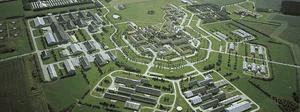Danish Institute of Agricultural Science
The Danish Institute of Agricultural Sciences (DIAS) is a sector research institution under the Ministry of Food, Agriculture and Fisheries. DIAS was established on April 1, 1997 with the merging of the Danish Institute of Animal Science and the Danish Institute of Plant and Soil Science. With its approximately 1,125 employees DIAS is one of the largest research institutions in Denmark. internet:www.agrsci.dk
 The Department of Animal Breeding and Genetics has about 60 employees of which 35 are classed as scientists. Focus is on genetically improvement of animals for disease resistance, constitution, and behaviour. Modern animal husbandry is based on advanced theoretical breeding methods and principles, and increasingly relies on research in biometry, gene technology and reproductive biology. The department also leads the national effort to preserve genetic resources in Danish farm animals.
The Department of Animal Breeding and Genetics has about 60 employees of which 35 are classed as scientists. Focus is on genetically improvement of animals for disease resistance, constitution, and behaviour. Modern animal husbandry is based on advanced theoretical breeding methods and principles, and increasingly relies on research in biometry, gene technology and reproductive biology. The department also leads the national effort to preserve genetic resources in Danish farm animals.
DIAS has a long experience in research on behaviour and behavioural problems of laying hens. At the Institute, lines of laying hens have been developed differing in the level of feather pecking (Kjaer et al., 2001). These lines are unique in the world, and they will provide birds for the experiment on litter preferences (WP4) and genetic differences in stress physiology (WP5). With regard to genetic analyses, the Institute will provide world-renowned experts in the field of data analyses using animal models and computer programs for estimating genetic parameters.

Dr. J. Kjær has been employed at DIAS from 1990 until 2005. He held a position as a senior research scientist, Department of Animal Health and Welfare, Danish Institute of Agricultural Sciences. Dr. J. Kjaer currently is working at FAL, Celle, Gemany.
Areas of research are mainly connected to welfare in poultry and game birds. The behaviour, health and physiology of different laying strains in egg production systems alternative to battery cages has been a key issue. The abnormal behaviours of feather pecking and cannibalism are causing attention. Genetic studies on feather pecking has been conducted since 1993 resulting in divergent selection lines differing in level of feather pecking. Studies on neuroendocrinology in relation to feather pecking have been conducted since 1997. He was responsible for the DIAS participation in the project. With his wide experience in poultry behaviour, he was WP-leader of WP4. Since 2005 Dr. Kjaer is employed by the Federal Agricultural Research Centre, Institute for Animal Welfare and Animal Husbandry, located in Germany. (E-mail: joergen.kjaer@fal.de)
(Email: joergen.kjaer@fal.de)
Prof.Dr. P. Sørensen is employed at DIAS since 1973 and now holding a position as Deputy Head of Departent at Department of Animal Breeding and Genetics.
Fields of work include: Selection- and breeding experiment with poultry, scientific investigation on genetic adaptation of poultry to new management systems, genetic aspect of leg disorders in broiler chickens, poultry research in Developing countries, teaching Poultry breeding and genetics at M. Sc. courses at the Royal Veterinary and Agricultural University, Copenhagen, co-ordination of research in poultry at DIAS, and support the Head of department in administration and managing the department.
He has participated in WP4 and WP5 of the LayWel project with special focus on the estimation of genetic parameters.
(Email: p.sorenson@agrsci.dk)